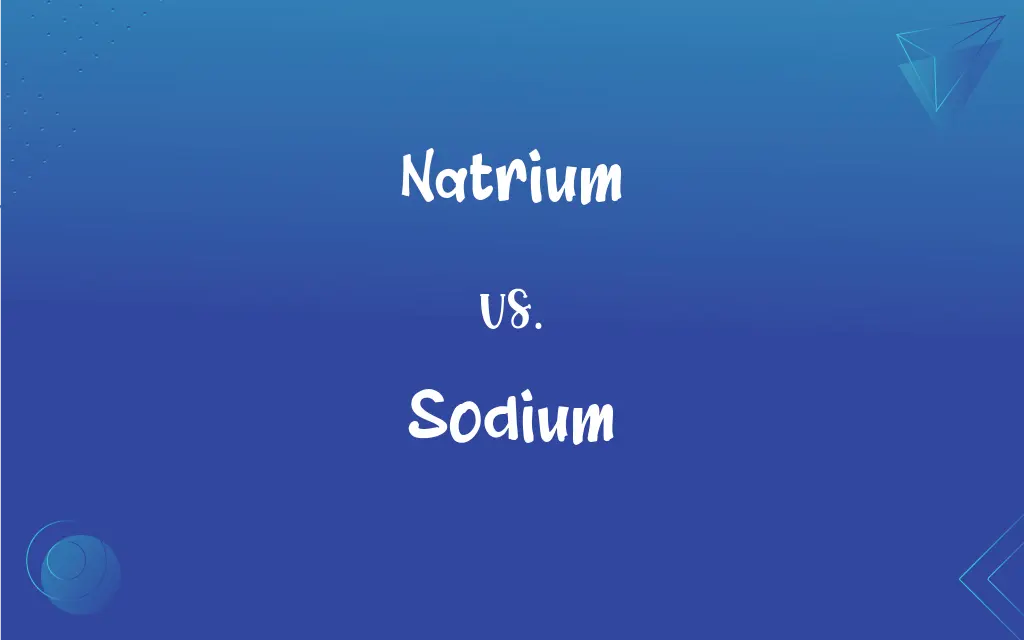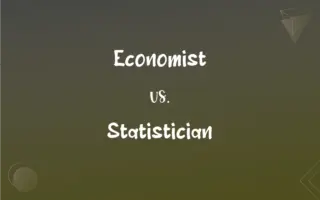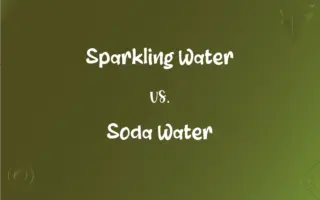Natrium vs. Sodium: What's the Difference?
Edited by Aimie Carlson || By Janet White || Published on February 23, 2024
Natrium and sodium refer to the same chemical element (symbol Na) but differ in terminology; "natrium" is the Latin and some European languages' name, while "sodium" is the English term.

Key Differences
Natrium, derived from the Latin word for sodium, is recognized by its symbol 'Na', which originates from the Latin 'natrium'. Sodium, the English equivalent, also uses the symbol 'Na', reflecting the Latin origin of the word. Both terms denote the same element, used extensively in the periodic table.
In terms of etymology, "natrium" was coined from an ancient word for a sodium compound, while "sodium" originates from the English adaptation of the word. The term "natrium" is predominantly used in many European languages, whereas "sodium" is the term commonly used in English-speaking countries.
Scientifically, natrium and sodium have identical properties as they are the same element. Natrium, in European scientific literature, is synonymous with sodium in the English-speaking scientific community. Both are essential in various chemical and biological processes.
The usage of 'natrium' or 'sodium' often depends on linguistic preferences. In Europe, 'natrium' is widely recognized in scientific and general contexts, while 'sodium' is predominantly used in English-speaking countries, both in science and daily life.
In industrial and commercial contexts, products containing this element may be labeled differently based on the region. In many non-English-speaking countries, 'natrium'-based compounds are common, whereas in English-speaking regions, 'sodium'-based names are used, reflecting the linguistic preferences.
ADVERTISEMENT
Comparison Chart
Language Origin
Latin
English
Usage in Science
Common in Europe
Common in Anglophone countries
Symbol
Na
Na
Etymology
Ancient compound
English adaptation
Industrial Use
Labeled as Natrium in non-English-speaking countries
Labeled as Sodium in English-speaking countries
ADVERTISEMENT
Natrium and Sodium Definitions
Natrium
Natrium is essential in various industrial processes.
Natrium compounds are used in glass manufacturing.
Sodium
Sodium is a chemical element with the symbol Na.
Sodium is abundant in the Earth's crust.
Natrium
Natrium is present in many minerals.
Natrium nitrate is a common mineral form.
Sodium
Sodium is crucial in maintaining human health.
Sodium chloride is common in diets.
Natrium
Natrium is the 11th element in the periodic table.
Natrium has a crucial role in the alkali metal group.
Sodium
Sodium is used in various industrial applications.
Sodium vapor is used in street lighting.
Natrium
Natrium is a soft, silvery-white, highly reactive metal.
Pure natrium reacts vigorously with water.
Sodium
Sodium reacts explosively with water.
Sodium must be stored in oil to prevent reaction with air.
Natrium
Natrium is vital for biological functions.
Natrium ions help regulate body fluids.
Sodium
Sodium ions conduct electricity in solution.
Sodium is vital in nerve impulse transmission.
Natrium
Sodium.
Sodium
A soft, light, extremely malleable silver-white element that is an alkali metal, reacts violently with water, is naturally abundant in combined forms, especially in common salt, and is used in the production of a wide variety of industrially important compounds. Sodium ions are essential to numerous biological processes in animals. Atomic number 11; atomic weight 22.9898; melting point 97.80°C; boiling point 883°C; specific gravity 0.971 (20°C); valence 1. See Periodic Table.
Natrium
The technical name for sodium.
FAQs
What is sodium?
Sodium is a chemical element, symbol Na, known as natrium in some languages.
What is the symbol for natrium/sodium?
The chemical symbol is Na for both natrium and sodium.
Are natrium and sodium the same?
Yes, natrium and sodium refer to the same chemical element.
What is natrium?
Natrium is the Latin name for the chemical element sodium, symbol Na.
Why is sodium called natrium in some languages?
"Natrium" originates from Latin and is used in many European languages.
Can natrium exist freely in nature?
No, it's too reactive and is found in compounds.
Are there dietary sources of natrium/sodium?
Yes, common in foods as sodium chloride (table salt).
What role does natrium play in the body?
It helps regulate fluids and is involved in nerve function.
Is natrium harmful?
Natrium, like sodium, can be harmful in excessive amounts.
What is the difference in usage of natrium and sodium?
It's mainly linguistic; natrium in Europe, sodium in English-speaking countries.
Where is natrium/sodium found?
It's found in the Earth's crust and in many minerals.
What precautions are needed when handling sodium/natrium?
It should be handled with care due to its reactivity, especially with water.
What are the environmental impacts of sodium/natrium?
Excessive amounts can affect water quality and soil health.
What are common uses of sodium/natrium?
Used in cooking, industries, and biological processes.
Is natrium natural or synthetic?
Natural, although it's often refined for use.
Is sodium important for health?
Yes, it's essential for body fluid balance and nerve function.
Can natrium be recycled?
In some forms, yes, particularly in industrial processes.
Are there any medical uses for sodium/natrium?
Yes, in IV solutions and some medications.
How is natrium/sodium stored?
Under oil or in an inert atmosphere to prevent reaction with air or water.
Is natrium found in the ocean?
Yes, as sodium ions, it's a major component of seawater.
About Author
Written by
Janet WhiteJanet White has been an esteemed writer and blogger for Difference Wiki. Holding a Master's degree in Science and Medical Journalism from the prestigious Boston University, she has consistently demonstrated her expertise and passion for her field. When she's not immersed in her work, Janet relishes her time exercising, delving into a good book, and cherishing moments with friends and family.
Edited by
Aimie CarlsonAimie Carlson, holding a master's degree in English literature, is a fervent English language enthusiast. She lends her writing talents to Difference Wiki, a prominent website that specializes in comparisons, offering readers insightful analyses that both captivate and inform.
































































